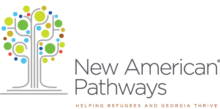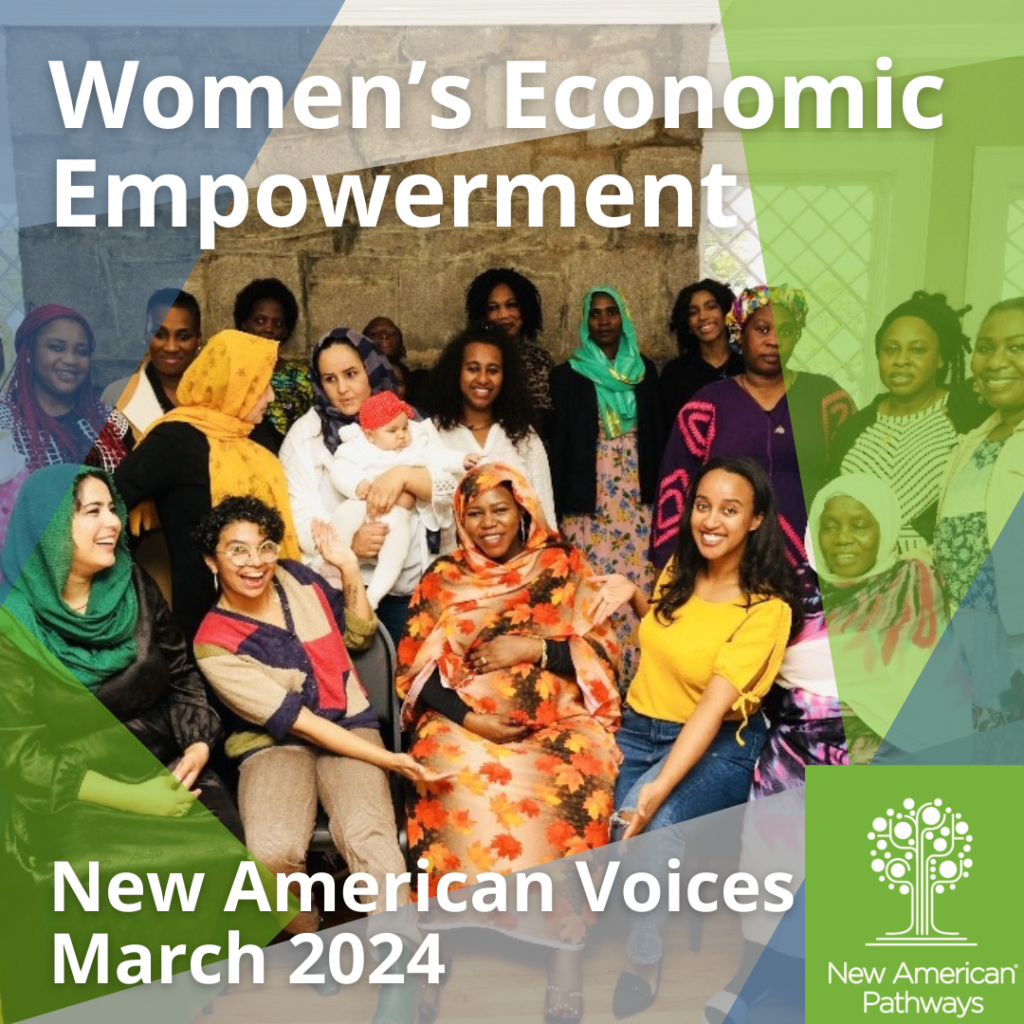The Women’s Economic Empowerment (WEE) Program provides refugee and immigrant women with education and support to build financial stability, economic empowerment, and self-sufficiency. Through a comprehensive approach encompassing courses and support programs, participants can cultivate financial literacy, build English fluency, and develop goal-setting skills. There are opportunities to build credit and achieve career growth, and match-saving financial programs that can fund childcare, education, and home and/or car ownership, fostering overall prosperity and empowerment.
In a conversation excerpt, WEE Program Coordinator, Ikhlas Mohammed and former Family Empowerment Manager, Ines Rodriguez, reflect on the inception and growth of the Women’s Economic Empowerment program.
INES:
We want to talk about the Women’s Economic Empowerment program, the challenges, the successes, and the opportunities in developing this program so far. Just to start off, take us back in time to when this program first started. Take us back to 2021 and tell us a little bit about what your goals, ambitions, and dreams were back then for the program. What were the things inspiring you to start this program?
IKHLAS:
The first inspiration that I had was with women’s empowerment because that is my passion. I have always been passionate about helping women to have better lives, to thrive, to handle life and all the challenges that they go through. I used to do that in my life, in my personal life. And when I was back home, I used to do it with my work, but it has been something that’s been a part of me all the time. So that was the first thing that motivated me. The second thing was the fact that the program is targeting immigrant women, because I am an immigrant woman and have been through a lot of challenges to settle, to have a life in this country. When I came I didn’t know anyone.
I have been hustling a lot just to get myself a roof, some food, and all the basics. So I felt the calling was for me because I was in that place and I’m still having a lot of things that I’m struggling with as an immigrant woman. Meeting basic needs, helping someone to have self sufficiency, and to start their life independently in this country is something that has moved me a lot, and I felt that the calling was for me.
INES:
I want to highlight two things. A big part of being new in the country, being an immigrant woman, navigating legal status, is what put you in a position to have to hustle so hard and to need so many resources. But also that you are already coming into the US and also coming into this work with a lot of background of empowering women back home. So tell us a little bit about that.
IKHLAS:
My background, I started helping women back when I was working with the United Nations Hybrid Operation in Darfur (UNAMID), the UN and African Union Mission in Darfur.
And through that job, I didn’t feel like I was helping in the capacity that was needed because the job was meeting women every day in displacement camps and speaking with them about their situation. My role was just to make an interpretation and translation for those meetings. So I was always feeling the sadness of people overall, in the camps, because they were expecting more than just us coming and speaking to them and writing a report and sending it. They needed more than that, they needed safety, security, and food. And specifically for women, they needed safety and security because all the activities they used to do were based on going out, and that was making them a target. They were being targeted by the militia, and some of them were being killed, some of them were beat, and some were being raped. And the luckiest person would just get their stuff taken away from them. They had to deal with that on a daily basis. And we went there just to speak about their situation, write a report, and go back. I’m not saying that it wasn’t important to have that mission, it’s just that it wasn’t meeting the needs and expectations and the hopes of people there.
So it started there. And when I saw that it wasn’t effective enough in helping women in the camp, I decided to make a volunteering board. I used to teach classes inside the camps and outside the camps. I taught women on weekends and on evenings when I was off work. I taught them English and we spoke about different issues they went through, and I just tried in my capacity to give them tips on how to navigate those challenges and how to deal with them. And that wasn’t enough, of course, but I felt more useful when I started doing that.
Then I decided to study for a masters degree in gender studies, which taught me a lot about how women experience discrimination, violence, and economics differently based on their background, based on their immigration status, based on their religion. And that gave me more insight on how to be more mindful when I deal with women who are more vulnerable, compared to women who are coming from a better place.
I then came here for a fellowship with the US Institute of Peace. The fellowship was about peacebuilding and conflict resolution in Sudan, so the paper that I wrote was about women’s role in conflict resolution in Darfur. The women were left behind by their partners, or their male family members, and they found themselves responsible for a family of at least four kids. They have to go outside every day and face all those things, but at the same time, they are not being represented in the peace talks. When there is any peace agreement, women are not represented, and their issues are not being highlighted because of that. I spoke about the role that they play in their everyday lives, but also the role that they could have played if they had the opportunity to be more involved and more included. My recommendation was to give more inclusion to women in the peace talks and the peace agreements so that we see an actual representation of what’s going on on the ground, because no one can talk about their issues more than they can.
INES:
So you’re coming in with lived experience, professional experience, academic experience, international experience. And you brought in this lens, this whole background of wisdom and experience and also of belief. I think there’s a deep sense of belief that you’ve brought into the program that has really transformed the way that the program has evolved and developed.
So just for background, I’m going to give a little bit of stats and data and all of these things. In 2021, when we first launched the program, we were really starting from zero, we didn’t have a client list, we didn’t have any partnerships formed. We knew that we were part of New American Pathways, and so we knew in our local context what the needs of women were, which at that time, a lot of it was around driving and employment. And our program is around financial literacy. So the ask that was made of us was to teach women how to manage and budget money. Now, I want you to talk a little bit more about the process of working with clients and how even though our program is financial, it’s so much more than that. So why and how is it more than that?
IKHLAS:
At the beginning, most of the clients needed assistance with getting their driver’s licenses and being enrolled in ESL. We were trying to teach clients how to deal with finances in the US, but they weren’t working and they didn’t have driver’s licenses. So for them, this wasn’t really meeting any need. We had to rewrite some of our structure to meet the needs and to put some of our activities on hold, like the financial education and financial literacy workshops.
We were in a situation where we needed to dive deeper and know more about how to help clients the way that they needed and to put ourselves in their places. We were talking about managing money, but they didn’t have a source of income. So I thought, if somebody taught me how to manage money when I didn’t even have work authorization, when I just started working as a cashier and service person in a restaurant and my pay was $7. I wouldn’t have needed to hear how to manage money because that didn’t meet my needs. I was barely paying my rent where I used to live with five people in two bedrooms. When I thought about it like that and I put myself in their shoes, I understood their perspective.
So then we started providing the service of driver’s education. We had to do that for some time until that need was met, while at the same time helping them to find jobs so that they could make the payments for their cars. And at the same time, being open to listening about how to manage their money, because now they have money. So that was it. And we discovered that it was more than just economic empowerment, because actually, the educational piece, yes, it speaks about finances and all that. But it also speaks about how to craft your world in a smart way, how to create and build and develop and maintain, you know, and to track yourself through a SMART goal. The SMART goal can include things that will help you to stay economically stable, but at the same time it can be related to anything in your life. And that’s the concept of having a SMART goal – it can be applied to many things.
The knowledge that they were getting on how to manage their finances wasn’t just giving them education about finances, but it also was giving them the confidence that they needed. Because the feedback I’m getting from our clients now is that they feel more confident, they feel more independent, they feel like nobody can break them. So many good things I’m hearing. So it is beyond that. And the certifications they’re getting, it gives them the feeling that they have accomplished something that’s also beyond economic empowerment.
And this is something I am so happy that you asked me because I also feel that this program is providing more than economic empowerment, it’s actually human development. Because I see so many examples of women that came to the program, and they had nothing, but now I see where they are. I can say yes, economically, they’re independent, they have work, they live a decent life. And at the same time, their confidence has risen so high and they feel more empowered. This is the most rewarding thing that you can see when you work with a client.
INES:
It’s beautiful. No data point can capture that transformation.
And so I think, a lot of times in the American context, we focus so much on self sufficiency, self sufficiency, take care of yourself. But really, the journey to taking care of yourself is the journey of being taught, being believed in, being mentored, being coached, being supported, being reminded, being encouraged. And also just being shown, here are the steps, take this step, then the next step, and the next. And so in that way, it’s really not a story of self sufficiency, it really is a story of commitment and collaboration from all of the parties involved. But also that now, when women walk away, they can leave with the confidence of saying, “I did it, you can too.” It’s human development.

